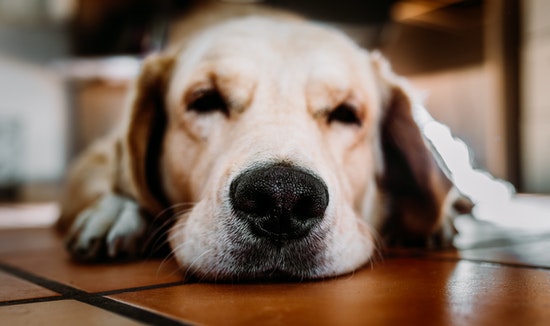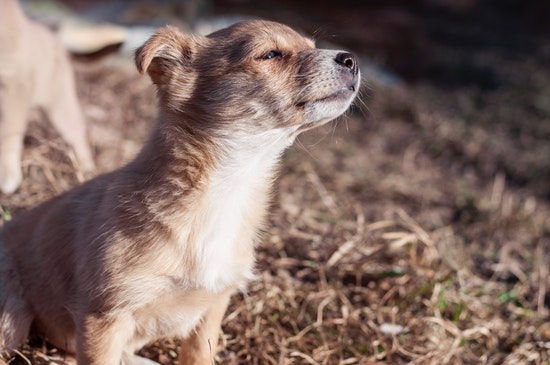Our dogs have a more robust sense of smell than us. To put it into comparison, humans have at least five million scent receptors working in our noses, which is significantly lesser than most dog breeds, with at least 100 million scent receptors working on those cute little noses. Hence, it makes so much sense that they also utilize it in transmitting any information. When we do things, be it grocery shopping or studying, we humans look at things to examine them. We do not smell things, unlike dogs who need to smell everything they are curious about.
However, the question remains unanswered, why is my dog sniffing everything in the house? It is because the sense of smell is considered to be a dog’s primary sense. Just as humans use their eyes to get a hold of their environment, dogs rely on their noses to explore the world. Without doing so, they will not be able to collect information about the environment they are in.
A dog’s nose is its primary way of sense.

Dogs use their noses, in the same manner we use our eyes. It is just a primary thing. Smells can give dogs much more information than their other senses, such as touch, vision, sounds, or taste. When we think about how dogs greet other dogs, information travels faster through their noses compared to paw shakes or barks. Indeed, dog noses can get so much information via scents more than we can imagine. Our human brain is just not wired like that.
Our dogs can smell some scents in parts per trillion. However, this does not only mean that they can smell subtle odors humans miss. The sense of smell also gives the dogs ability to detect a complexity in scents that humans usually cannot. We might smell strawberry cupcakes, but dogs can smell the flour, eggs, butter, strawberry, and many more. In dog greetings, they do not sense each other’s doggy scent; instead, they can detect genders, ages, and health statuses.
You may ask, what makes the dog noses so effective? Dogs have a specific organ called the vomeronasal organ, which we can find between the roof of the dog’s mouth and the bottom of their nasal passage. The vomeronasal organ can also be called Jacobson’s organ and contains special receptors to detect pheromones. As a matter of fact, this organ in action when you notice a dog’s tendency to sniff females who are undergoing their monthly menstrual cycles.
Dogs gather information through their sense of smell.
You have probably seen your dog sniffing and running around the place, apparently looking for something. Well, that’s likely because dogs can independently wiggle their nostrils to ascertain which nostril the smell came in, which in turn helps them determine the source of the scent.
This is mainly observed in food smell. Dogs tend to sniff the floor areas where food bits were recently dropped. Through smelling the place, dogs will know if there are other animals around. This ability also helps to figure out if prey or predators are just around the corner.
Dogs are just wired for smelling.

With all the talk about dogs having millions of smell receptors which means that they smell so much more than humans, it is not surprising that dogs’ brains have a larger olfactory cortex than us. Just like the human brain, various sections of the dog’s brain specialize in specific things.
In fact, the section of the brain that controls the sense of smell in dogs is forty times larger than ours. One-eighth or thirteen percent of their brain is dedicated simply to finding out scent meanings, which is comparably greater than the section of the human brain that is solely devoted to sight and vision. Thus, it is never an exaggeration to suggest that the man’s best friend’s sense of smell is much more powerful and robust than a human’s sense of sight.
Nervousness, Avoidance, and Stress.
Aside from sniffing around for food and other dogs, dogs sniff for numerous behavioral reasons. For example, nervousness in dogs can sometimes come to light as sniffing and pacing around the place. The reason for this might be because they have seen or heard a strange person, animal, or object that they are trying to sniff out. Dogs can also exhibit the same behavior to avoid unwanted and uncomfortable situations. For example, when you are walking your dog and come across a person they dislike, dogs tend to sniff the ground until they have walked away.
Furthermore, excessive sniffing can be an indicator that your dog is under severe stress. In a similar fashion to avoidance, dogs tend to sniff around the place more to distract themselves from the potentially stressful situation. When faced with a highly stressful situation, dogs tend to exhibit signs of stress through lip licking, yawning, stretching, shaking, freezing, reduced appetite, increased shedding, and unusually sweaty paws. It might be best to investigate what is causing your dogs such distress and eliminate it if this happens.
Conclusion
Sniffing and dogs are words that usually come hand in hand. Dogs are naturally curious creatures who explore the world using their paws and their powerful nose. Preventing them from exploring the world through the sense of smell is like putting a blindfold on a curious and hyper kid. Letting your dog sniff around your home provides them with essential information and mental stimulation. Thus, you may ask, how can you better meet your dogs’ need to sniff?
You should make your dog’s walk an enjoyable activity by allowing them enough chances for sniffing. Trees and fire hydrants along the way are essential sources of information for your dog. However, it will not do the both of you any good if you let them sniff around the same tree for hours. Exercise control by telling them to “leave it” as a cue that they need to move on and continue the walk. It is also nice to reward them with frequent sniff breaks when loose-leash walking. Train them with a “go sniff” cue to let your dog know that it is time for a break, and it is now okay to relax and do some happy sniffing around.

